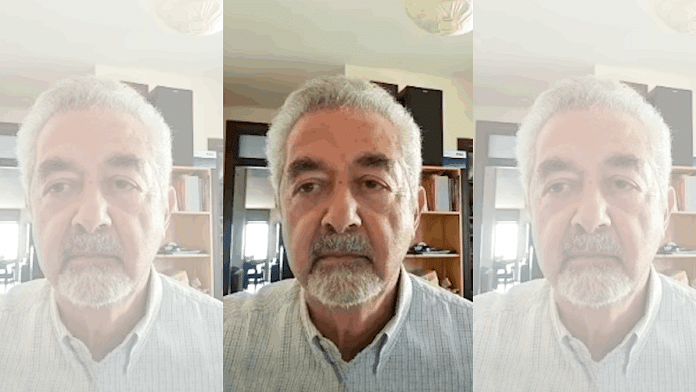New Delhi: Palestinian human rights activist Ghassan Abdallah moved to Ramallah in West Bank in 1994, with the hope that peace would prevail. Before that, he was a “refugee’ living near Haifa, a city in Israel, he said.
This was soon after the signing of the Oslo Accords (1993), a set of agreements between Israel and the Palestine Liberation Organization for peace in the Israel-Palestine conflict through a two-state solution.
Twenty-nine years later, Abdallah, now 81, believes there is hardly any hope of a Palestinian state amid the ongoing war between Israel and Hamas.
“I was hoping to see an end to the conflict, but unfortunately, these hopes are dying in the heat of the battle,” he said to ThePrint in a video interview from Ramallah.
Israel and Hamas are locked in a war triggered by the Palestinian militant organisation’s attack on the former on 7 October. In response, Israel launched a counter-offensive — ‘Swords of Iron’ — on Gaza, the region controlled by Hamas since 2007.
As of now, all access points to the West Bank have been closed off by the Israeli authorities, while daily activities such as disposing of daily waste seem impossible.
Relieved that the access to food and water remains uninterrupted, Abdallah — a board member of Palestinian human rights organisation Al-Haq — noted that the change in Israel’s government close to 10 months ago helped build up to the ongoing situation. He was referring to Benjamin Netanyahu returning to power on 29 December 2022 following elections, at the head of a hard-Right government.
He described Israel’s Minister of National Security Itamar Ben-Gvir as an “extreme religious Zionist”, and blamed people like the latter for attacking and destroying Palestinian homes.
“Over these months, more than 200 Palestinians have been killed by Israeli settlers and the army. This is one background as to why the Palestinian resistance [Hamas] launched the attack on Israel. The latter were also invading the Al-Aqsa mosque in Jerusalem and spitting on Christians carrying crosses. This fascist government has brought the situation to a boil,” he said.
But for him, the issue goes back to the long-drawn history of the conflict, and he noted that Palestinians have been fighting ever since 1948, when Israel was established.
Day-to-day life in Ramallah right now involves people scrambling for provisions, while schools and universities remain shut, he said. Many have relatives in Gaza they are worried about and close to 20,000 workers from Gaza remain stuck in the West Bank, disconnected from their families, he added.
“There are many in places such as Ramallah, Nablus and Hebron where these workers remain stuck and local residents are trying to help them connect with relatives in Gaza,” said Abdallah.
Life, as it stands now, remains grim for Abdallah as he hears warplanes passing over the city he loves so dearly. While Abdallah categorically mentioned he is against the targeting and indiscriminate killing of civilians, his experience of witnessing Israeli authorities executing “war crimes” brought about a thought.
He said, “If the Israeli military occupation is so ugly, how do you expect the resistance to be pretty? This has been going on for so long that there is so much hatred, suffering and agony on both sides. There are thousands of Palestinians held without due process.”
Asked what would bring immediate peace, the 81-year-old noted “even in history, peace comes after war”.
‘Israeli occupation’ vs hope for Palestinian state
But it’s not just heavy-handed actions and brute force alone that comprise “Israeli occupation” for Abdallah — he said the country also controls the population register, and every Palestinian has to hold a card, issued by the authorities, as a long-term resident of the Palestinian territories.
“So, anyone travelling, marrying, divorcing or having children is controlled and recorded by Israeli authorities. This administrative control and occupation is not talked about much, but it does affect people’s lives and their basic movement,” he said.
He noted that, after the Oslo Accords were signed, people were optimistic about peace and hoped for a Palestinian state next to an Israeli state. However, the 1995 killing of Prime Minister Yitzhak Rabin, who signed the accords, and attacks on Israel that followed, dashed these hopes.
“Now, there is hardly any hope that there could be a Palestinian state. Since 1967, the Israelis colonised Palestinian areas, and the numbers kept going up, regardless of the situation. The international community, especially the USA and Europe, keep supporting Israel unconditionally,” he said.
Abdallah said he does not see a future for his people, adding that they are “stuck between Islamic fundamentalists, Jewish fundamentalists and American evangelical fundamentalists”.
He said, “People who are secular and rational are in the minority. There are 9,00,000 Israelis who live outside Israel now, and most of them tend to be secular. And again, there are Palestinians who live outside who are also secular. This, as a whole, is unfortunate.”
While he noted that misinformation has also worsened matters, for which he primarily blamed the Western media, he said the rest of the world can mediate a better solution to the conflict.
“Last Saturday’s action (7 October attack by Hamas) shows that the Palestinians are not going anywhere and our right to self-determination has to be respected,” he said.
When asked whether non-violence is the path forward, Abdallah said the international law gives people under occupation the right to resist in every possible way “including violence”, providing that they do not attack civilians on purpose.
He asserted, “Unfortunately, you cannot control this and there are always casualties on both sides. As someone involved with human rights for a long time, I would not like to see this.”
(Edited by Smriti Sinha)



